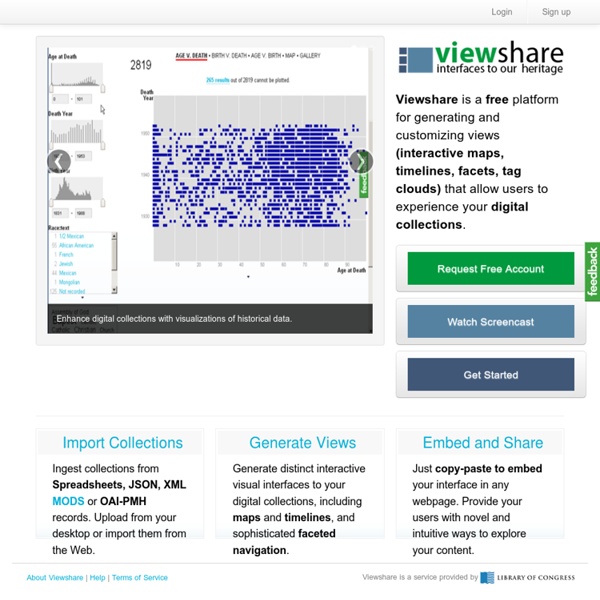



Coffitivity - Increase Your Creativity! Datavisualization.ch Selected Tools Data Wrangler UPDATE: The Stanford/Berkeley Wrangler research project is complete, and the software is no longer actively supported. Instead, we have started a commercial venture, Trifacta. For the most recent version of the tool, see the free Trifacta Wrangler. Why wrangle? DH Curation Guide | a community resource guide to data curation in the digital humanities | DH Curation Guide Research Data Bootcamp | Research Data Service Image: Twitter Data by Michael Gallagher This online tutorial is appropriate for all members of the University who undertake research with some kind of digital aspect. It will be relevant whether or not your research is funded by an external sponsor. The aim is to enable you to produce high quality data with potential for long-term use. You can work through the tutorial step-by-step using the navigation arrow on the right, links at the bottom of each screen or use the menu above the arrow to jump to a particular section. The tutorial includes several questions (not numbered consecutively) and the answer to each question will be revealed when you make your selection. This tutorial offers an elementary introduction to the key facets of research data management. The bootcamp is designed to:
Data Management | Swedish National Data Service Data management is a method used to handle, organise, structure and store research data throughout the research process. A good data management strategy takes into account technical, organisational, structural, legislative and sustainability aspects. It thus helps researchers to keep the data collected and/or used within their project tidy, useable and safe, while at the same time ensuring their longevity. SND’s data management pages are in Swedish only and this is for a good reason: The English-speaking already has access to a wealth of high-quality data management literature, both published and online. University of Bristol Research Data Bootcamp Brief introduction to research data management, said to take only 30 minutes. The Digital Curation Centre’s Curation Reference Manual A very extensive manual of data curation which, however, is still in the making. Managing and Sharing Data DMPonline
Curation Reference Manual Access the Manual online So far, we have commissioned our network of specialist partners and associates to author more than 20 instalments of the Manual. We also welcome your suggestions for further topics. Completed chapters | Chapters in production Each instalment is designed to help data custodians, producers and users better understand the challenges they face and the roles that they play in creating, managing and preserving digital information over time. To ensure that the Curation Reference Manual remains as relevant as possible, the DCC will undertake periodic reviews of the individual instalments and may commission updates where necessary to reflect any major developments in digital curation. As an added quality control, our peer review panel, comprising a number of international experts in the field of digital curation, reviews each instalment produced.
RDFa Reproducing the Academy: Librarians and the Question of Service in the Digital Humanities | Roxanne Shirazi The following is a version of the talk I gave as part of a panel at ALA sponsored by the Women and Gender Studies Section of ACRL and organized by Heather Tompkins (Carleton College). The title of the panel was “Digital Humanities and Libraries: Power and Privilege, Practice and Theory,” and included Jane Nichols, Elvia Arroyo-Ramirez, and Megan Wacha. Thank you, Heather, and the Women and Gender Studies Section for inviting me to be here on this panel. I want to start out by noting that the title of the panel is “Digital Humanities and Libraries” – but what I am here to talk about today is actually digital humanities and librarians. First, I’m going to assume that you all have a basic understanding of the digital humanities, and Jane’s done a fantastic job of explaining the type of work that gets done in this area, so I’m not going to get into the definitional question. But—as I said earlier—I’m here to talk about librarians, not libraries. Feminization Ahem. Professions Emotion Work